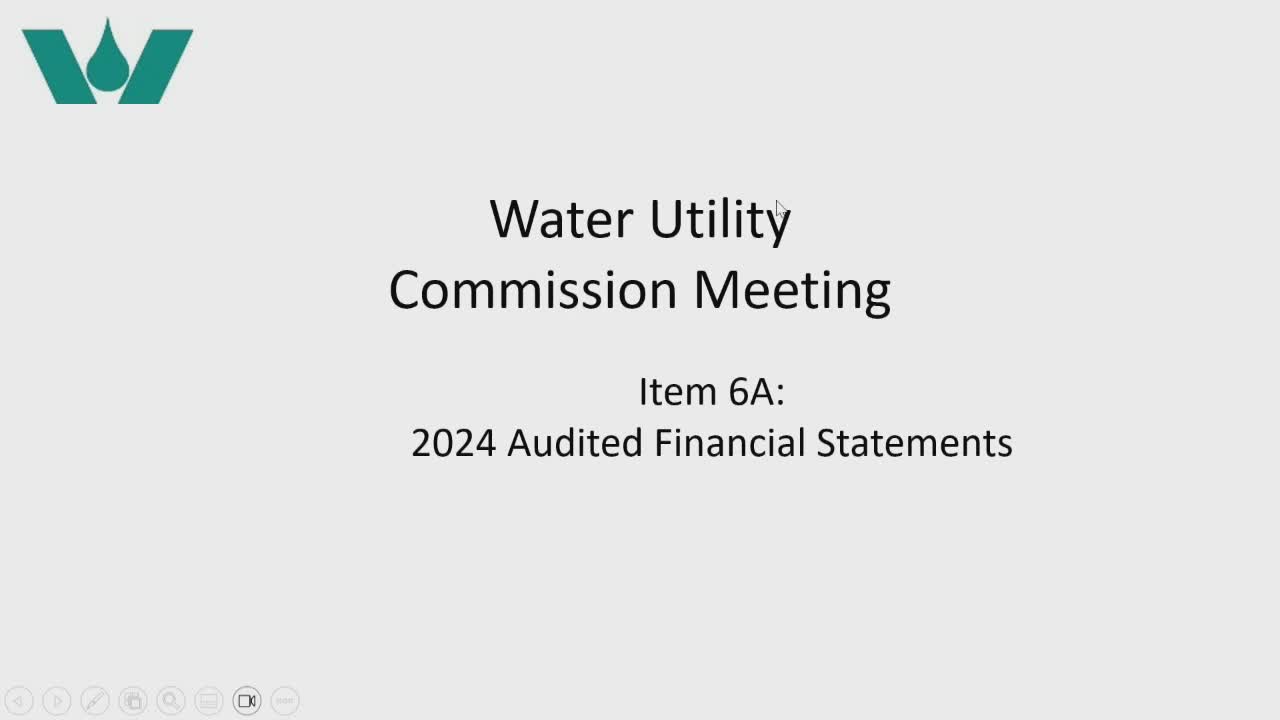Baker Tilly completes 2024 audit with unmodified opinion for local utilities
June 19, 2025 | Waukesha City, Waukesha County, Wisconsin
This article was created by AI summarizing key points discussed. AI makes mistakes, so for full details and context, please refer to the video of the full meeting. Please report any errors so we can fix them. Report an error »

The Waukesha Water Commission convened on June 19, 2025, to discuss the results of the 2024 audit and financial statements, highlighting the city's financial health and operational performance. Jody Dobson from Baker Tilly presented the audit findings, confirming that the city received an unmodified or "clean" opinion, indicating that the financial statements fairly represent the city's financial position.
A key point of discussion was the implementation of a new accounting standard concerning compensated absences, which required a consistent approach to recognizing liabilities related to employee benefits. This change was deemed minor and did not significantly alter the financial landscape compared to previous years.
The commission reviewed critical financial benchmarks, including the actual rate of return on investments. In 2023, the city achieved a return of 2.9%, which improved to 4.1% by the end of 2024. This increase is attributed to changing interest rates and is expected to stabilize further in 2025.
Another significant topic was the city's cash reserves. The Government Finance Officers Association recommends maintaining at least three months of operating expenses in cash. However, the commission noted that having reserves closer to 12 months is preferable for maintaining high credit ratings. Currently, the city’s cash on hand has decreased slightly but remains stable, reflecting prudent financial management.
The debt coverage ratio was also analyzed, revealing that the city’s earnings exceeded the required 1.1 times annual debt service, achieving a ratio of 7.1. This strong performance is crucial for ensuring the city can meet its financial obligations.
The commission acknowledged the high percentage of assets financed through debt, currently at 81%. This is typical for utilities that have recently completed significant projects, such as a wastewater treatment plant, and is expected to decrease over time as the city manages its debt more effectively.
Overall, the meeting underscored the city's solid financial standing and the importance of strategic financial planning as it navigates future challenges. The commission will continue to monitor these metrics closely to ensure ongoing fiscal health and operational efficiency.
A key point of discussion was the implementation of a new accounting standard concerning compensated absences, which required a consistent approach to recognizing liabilities related to employee benefits. This change was deemed minor and did not significantly alter the financial landscape compared to previous years.
The commission reviewed critical financial benchmarks, including the actual rate of return on investments. In 2023, the city achieved a return of 2.9%, which improved to 4.1% by the end of 2024. This increase is attributed to changing interest rates and is expected to stabilize further in 2025.
Another significant topic was the city's cash reserves. The Government Finance Officers Association recommends maintaining at least three months of operating expenses in cash. However, the commission noted that having reserves closer to 12 months is preferable for maintaining high credit ratings. Currently, the city’s cash on hand has decreased slightly but remains stable, reflecting prudent financial management.
The debt coverage ratio was also analyzed, revealing that the city’s earnings exceeded the required 1.1 times annual debt service, achieving a ratio of 7.1. This strong performance is crucial for ensuring the city can meet its financial obligations.
The commission acknowledged the high percentage of assets financed through debt, currently at 81%. This is typical for utilities that have recently completed significant projects, such as a wastewater treatment plant, and is expected to decrease over time as the city manages its debt more effectively.
Overall, the meeting underscored the city's solid financial standing and the importance of strategic financial planning as it navigates future challenges. The commission will continue to monitor these metrics closely to ensure ongoing fiscal health and operational efficiency.
View full meeting
This article is based on a recent meeting—watch the full video and explore the complete transcript for deeper insights into the discussion.
View full meeting
